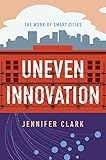Uneven innovation the work of smart cities Jennifer Clark
Material type: TextPublisher: New York Columbia University Press [2020]Edition: 1st editionDescription: 1 online resource (xiv, 311 pages) illustrationsContent type:
TextPublisher: New York Columbia University Press [2020]Edition: 1st editionDescription: 1 online resource (xiv, 311 pages) illustrationsContent type: - text
- computer
- online resource
- 0231545789
- 9780231545785
- 307.76 23
- HT153 .C583 2020eb
| Item type | Current library | Shelving location | Call number | Status | Date due | Barcode | Item holds | |
|---|---|---|---|---|---|---|---|---|
 Electronic Book
Electronic Book
|
Kuakarun Nursing Library | Processing unit | Online Access | Eb35499 |
Includes bibliographical references and index
Intro -- Table of Contents -- List of Illustrations -- Preface -- 1. Uneven Innovation: The Evolution of the Urban Technology Project -- 2. Smart Cities as Solutions -- 3. Smart Cities as Emerging Markets -- 4. Smart Cities as the New Urban Entrepreneurship -- 5. Smart Cities as Urban Innovation Networks -- 6. Smart Cities as Participatory Planning -- 7. Smart Cities as the New Uneven Development -- 8. Conclusions: The Local Is (Not) the Enemy -- Epilogue: The View from Inside the Urban Innovation Project -- Notes -- Bibliography -- Index
"The city of the future, we are told, is the smart city. By seamlessly integrating information and communication technologies into the provision and management of public services, such cities will enhance opportunity and bolster civic engagement. Smarter cities will bring in new revenue while saving money. They will be more of everything that a twenty-first century urban planner, citizen, and elected official wants: more efficient, more sustainable, and more inclusive. Is this true? In Uneven Innovation, Jennifer Clark considers the potential of these emerging technologies as well as their capacity to exacerbate existing inequalities and even produce new ones. She reframes the smart city concept within the trajectory of uneven development of cities and regions, as well as the long history of technocratic solutions to urban policy challenges. Clark argues that urban change driven by the technology sector is following the patterns that have previously led to imbalanced access, opportunities, and outcomes. The tech sector needs the city, yet it exploits and maintains unequal arrangements, embedding labor flexibility and precarity in the built environment. Technology development, Uneven Innovation contends, is the easy part; understanding the city and its governance, regulation, access, participation, and representation-all of which are complex and highly localized-is the real challenge. Clark's critique leads to policy prescriptions that present a path toward an alternative future in which smart cities result in more equitable communities"-- Provided by publisher
Description based on print version record
Master record variable field(s) change: 050
There are no comments on this title.

